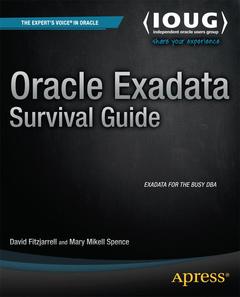Description
Oracle Exadata Survival Guide, 1st ed.
Authors: Fitzjarrell David, Spence Mary
Language: English
Subject for Oracle Exadata Survival Guide:
Approximative price 68.56 €
In Print (Delivery period: 15 days).
Add to cart284 p. · 17.8x25.4 cm · Paperback
Description
/li>Contents
/li>Biography
/li>Comment
/li>
Oracle Exadata is fast becoming the standard for large installations such as those running data warehouse, business intelligence, and large-scale OLTP systems. Exadata is like no other platform, and is new ground even for experienced Oracle database administrators. The Oracle Exadata Survival Guide helps you navigate the ins and outs of this new platform, de-mystifying this amazing appliance and its exceptional performance. The book takes a highly practical approach, not diving too deeply into the details, but giving you just the right depth of information to quickly transfer your skills to Oracle's important new platform.
- Helps transfer your skills to the platform of the future
- Covers the important ground without going too deep
- Takes a practical and hands-on approach to everyday tasks
- Exadata Basics
- Smart Scans and Offloading
- Storage Indexes
- Smart Flash Cache
- Parallel Query
- Compression
- Exadata Wait Events
- Measuring Performance
- Storage Cell Monitoring
- Monitoring Exadata
- Storage Reconfiguration
- Migrating Databases to Exadata
- Migrating ERP Applications
- Final Thoughts
Oracle Exadata Survival Guide leads the busy DBA through the concepts and optimizations of Oracle’s Exadata performance powerhouse, providing the information necessary for successful Exadata administration.




